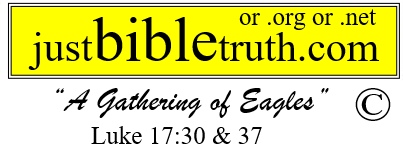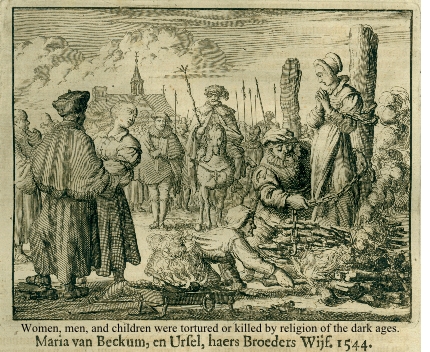 There was
There was a device a tool used during the dark ages called the dunking chair. The apostate church, which controlled the world and kept it in darkness during those millennia, used the dunking chair to "test" people (mostly women) for witchcraft.
 The test was simple as could be. A woman accused of witchcraft would be stripped and strapped in the chair. She would be publicly dunked in the local lake or river, and if she floated was a witch and would be burned. If she sank and drown, she was innocent of witchcraft.
This was one of the many horrible practices by the apostate church of the dark ages to keep it's members in line. They wanted to promote unity!
The test was simple as could be. A woman accused of witchcraft would be stripped and strapped in the chair. She would be publicly dunked in the local lake or river, and if she floated was a witch and would be burned. If she sank and drown, she was innocent of witchcraft.
This was one of the many horrible practices by the apostate church of the dark ages to keep it's members in line. They wanted to promote unity!
 They probably did among some of their ignorant and terrified members. To those with knowledge of the Bible, however, and who built faith in it, such practices were abhorrent. Those who realized the truth worked to undermine the authority of the apostate church, by dissolving the dark ages away into the light of truth.
The modern day group representing themselves as Jehovah's Witnesses will disfellowship anyone who questions anything they put in print, or anything stated by one of their leaders. All it takes is three "elder" men to conspire in a witch hunt to disfellowship any member, and they can make it so. (They claim there is an appeal process, but it is only to evaluate procedure. It is a sham.) If three men disfellowship someone, the whole organization, including friends and family, will join in the group's judgment by shunning the individual. They will blindly follow in doing so, with absolutely no knowledge of what the individual did wrong. If the disfellowshipped person makes any attempt to defend himself, it is proof of his guilt in their mind. They consider any defense by or in behalf of a disfellowshipped person (which might expose the wrongdoing of their group) as apostasy. (John 11:47-48) You do see the similarity? It might be the only reason they don't use the dunking chair is the protection afforded citizens of most nations by their governments; Governments who have wisely decided to separate church and state. [Many modern nations realize the great benefit to mankind by their escape (mostly) from the influence of the church which brought about the dark ages]. Most nations no longer allow religious groups the power to kill whom they choose. Enlightened nations realize religionist bigotry and hatred is responsible for most (or at least many) of the world's woes.
The hate spread by false religion is not just by those who blow up innocent women and children to make their point, it's those who blow up family relationships for the sake of their organizational doctrine as well. Each (false) religious group will point to the gross failings of others in their defense, when they detonate their bombs, or IED's, or hateful shunning proceedures. Two wrongs don't make a right. (Matthew 26:52 ; Luke 9:49-50 ; John 12:47-48 ; 1 Corinthians 4:3-5 ; Matthew 5:38-39)
We quote from their Watchtower what Jehovah's Witnesses were saying about judgment only a few years ago:
*** w80 5/1 p. 26 ‘Do Not Judge Others’ ***
"Imperfect humans are prone to compare themselves with others and to draw conclusions about the worth of their fellowmen. Often these conclusions are based on personal preference and taste or are influenced by differing backgrounds or training.
They probably did among some of their ignorant and terrified members. To those with knowledge of the Bible, however, and who built faith in it, such practices were abhorrent. Those who realized the truth worked to undermine the authority of the apostate church, by dissolving the dark ages away into the light of truth.
The modern day group representing themselves as Jehovah's Witnesses will disfellowship anyone who questions anything they put in print, or anything stated by one of their leaders. All it takes is three "elder" men to conspire in a witch hunt to disfellowship any member, and they can make it so. (They claim there is an appeal process, but it is only to evaluate procedure. It is a sham.) If three men disfellowship someone, the whole organization, including friends and family, will join in the group's judgment by shunning the individual. They will blindly follow in doing so, with absolutely no knowledge of what the individual did wrong. If the disfellowshipped person makes any attempt to defend himself, it is proof of his guilt in their mind. They consider any defense by or in behalf of a disfellowshipped person (which might expose the wrongdoing of their group) as apostasy. (John 11:47-48) You do see the similarity? It might be the only reason they don't use the dunking chair is the protection afforded citizens of most nations by their governments; Governments who have wisely decided to separate church and state. [Many modern nations realize the great benefit to mankind by their escape (mostly) from the influence of the church which brought about the dark ages]. Most nations no longer allow religious groups the power to kill whom they choose. Enlightened nations realize religionist bigotry and hatred is responsible for most (or at least many) of the world's woes.
The hate spread by false religion is not just by those who blow up innocent women and children to make their point, it's those who blow up family relationships for the sake of their organizational doctrine as well. Each (false) religious group will point to the gross failings of others in their defense, when they detonate their bombs, or IED's, or hateful shunning proceedures. Two wrongs don't make a right. (Matthew 26:52 ; Luke 9:49-50 ; John 12:47-48 ; 1 Corinthians 4:3-5 ; Matthew 5:38-39)
We quote from their Watchtower what Jehovah's Witnesses were saying about judgment only a few years ago:
*** w80 5/1 p. 26 ‘Do Not Judge Others’ ***
"Imperfect humans are prone to compare themselves with others and to draw conclusions about the worth of their fellowmen. Often these conclusions are based on personal preference and taste or are influenced by differing backgrounds or training.
True Christians, however, must guard against coming to view others in the wrong light. The Christian apostle Paul, when discussing the eating of food, set forth a principle that can help us to maintain balance in this important area of life. He wrote: “Let the one eating not look down on the one not eating, and let the one not eating not judge the one eating, for God has welcomed that one.”—Rom. 14:3.
Jehovah God welcomes all who seek to do his will. Why, then, should any human look down upon or judge others on the basis of what they do in a personal way? In the case under consideration, the one eating meat in good conscience may have tended to look down upon the one not eating, considering him to be overly scrupulous, an extremist. On the other hand, the one not eating might wrongly judge the one eating meat as a violator of law, a sinner. The Christian who is balanced in such areas of life—whether it pertains to food and drink, entertainment, clothing or the like—realizes that he is a mere servant or slave of God and as such has no right to evaluate others on the basis of his private opinions. So when it comes to things involving personal choice or preference, he does not look down on fellow believers nor does he judge them as wrongdoers."
Note the judgments they now render: Example_Danger_ClaimingSpiritualFood.html
Use browser "Back Arrow" or Alt+Left_Arrow keys to previous page. | Home Page
 The test was simple as could be. A woman accused of witchcraft would be stripped and strapped in the chair. She would be publicly dunked in the local lake or river, and if she floated was a witch and would be burned. If she sank and drown, she was innocent of witchcraft.
This was one of the many horrible practices by the apostate church of the dark ages to keep it's members in line. They wanted to promote unity!
The test was simple as could be. A woman accused of witchcraft would be stripped and strapped in the chair. She would be publicly dunked in the local lake or river, and if she floated was a witch and would be burned. If she sank and drown, she was innocent of witchcraft.
This was one of the many horrible practices by the apostate church of the dark ages to keep it's members in line. They wanted to promote unity!
 They probably did among some of their ignorant and terrified members. To those with knowledge of the Bible, however, and who built faith in it, such practices were abhorrent. Those who realized the truth worked to undermine the authority of the apostate church, by dissolving the dark ages away into the light of truth.
The modern day group representing themselves as Jehovah's Witnesses will disfellowship anyone who questions anything they put in print, or anything stated by one of their leaders. All it takes is three "elder" men to conspire in a witch hunt to disfellowship any member, and they can make it so. (They claim there is an appeal process, but it is only to evaluate procedure. It is a sham.) If three men disfellowship someone, the whole organization, including friends and family, will join in the group's judgment by shunning the individual. They will blindly follow in doing so, with absolutely no knowledge of what the individual did wrong. If the disfellowshipped person makes any attempt to defend himself, it is proof of his guilt in their mind. They consider any defense by or in behalf of a disfellowshipped person (which might expose the wrongdoing of their group) as apostasy. (John 11:47-48) You do see the similarity? It might be the only reason they don't use the dunking chair is the protection afforded citizens of most nations by their governments; Governments who have wisely decided to separate church and state. [Many modern nations realize the great benefit to mankind by their escape (mostly) from the influence of the church which brought about the dark ages]. Most nations no longer allow religious groups the power to kill whom they choose. Enlightened nations realize religionist bigotry and hatred is responsible for most (or at least many) of the world's woes.
The hate spread by false religion is not just by those who blow up innocent women and children to make their point, it's those who blow up family relationships for the sake of their organizational doctrine as well. Each (false) religious group will point to the gross failings of others in their defense, when they detonate their bombs, or IED's, or hateful shunning proceedures. Two wrongs don't make a right. (Matthew 26:52 ; Luke 9:49-50 ; John 12:47-48 ; 1 Corinthians 4:3-5 ; Matthew 5:38-39)
We quote from their Watchtower what Jehovah's Witnesses were saying about judgment only a few years ago:
*** w80 5/1 p. 26 ‘Do Not Judge Others’ ***
"Imperfect humans are prone to compare themselves with others and to draw conclusions about the worth of their fellowmen. Often these conclusions are based on personal preference and taste or are influenced by differing backgrounds or training.
They probably did among some of their ignorant and terrified members. To those with knowledge of the Bible, however, and who built faith in it, such practices were abhorrent. Those who realized the truth worked to undermine the authority of the apostate church, by dissolving the dark ages away into the light of truth.
The modern day group representing themselves as Jehovah's Witnesses will disfellowship anyone who questions anything they put in print, or anything stated by one of their leaders. All it takes is three "elder" men to conspire in a witch hunt to disfellowship any member, and they can make it so. (They claim there is an appeal process, but it is only to evaluate procedure. It is a sham.) If three men disfellowship someone, the whole organization, including friends and family, will join in the group's judgment by shunning the individual. They will blindly follow in doing so, with absolutely no knowledge of what the individual did wrong. If the disfellowshipped person makes any attempt to defend himself, it is proof of his guilt in their mind. They consider any defense by or in behalf of a disfellowshipped person (which might expose the wrongdoing of their group) as apostasy. (John 11:47-48) You do see the similarity? It might be the only reason they don't use the dunking chair is the protection afforded citizens of most nations by their governments; Governments who have wisely decided to separate church and state. [Many modern nations realize the great benefit to mankind by their escape (mostly) from the influence of the church which brought about the dark ages]. Most nations no longer allow religious groups the power to kill whom they choose. Enlightened nations realize religionist bigotry and hatred is responsible for most (or at least many) of the world's woes.
The hate spread by false religion is not just by those who blow up innocent women and children to make their point, it's those who blow up family relationships for the sake of their organizational doctrine as well. Each (false) religious group will point to the gross failings of others in their defense, when they detonate their bombs, or IED's, or hateful shunning proceedures. Two wrongs don't make a right. (Matthew 26:52 ; Luke 9:49-50 ; John 12:47-48 ; 1 Corinthians 4:3-5 ; Matthew 5:38-39)
We quote from their Watchtower what Jehovah's Witnesses were saying about judgment only a few years ago:
*** w80 5/1 p. 26 ‘Do Not Judge Others’ ***
"Imperfect humans are prone to compare themselves with others and to draw conclusions about the worth of their fellowmen. Often these conclusions are based on personal preference and taste or are influenced by differing backgrounds or training.